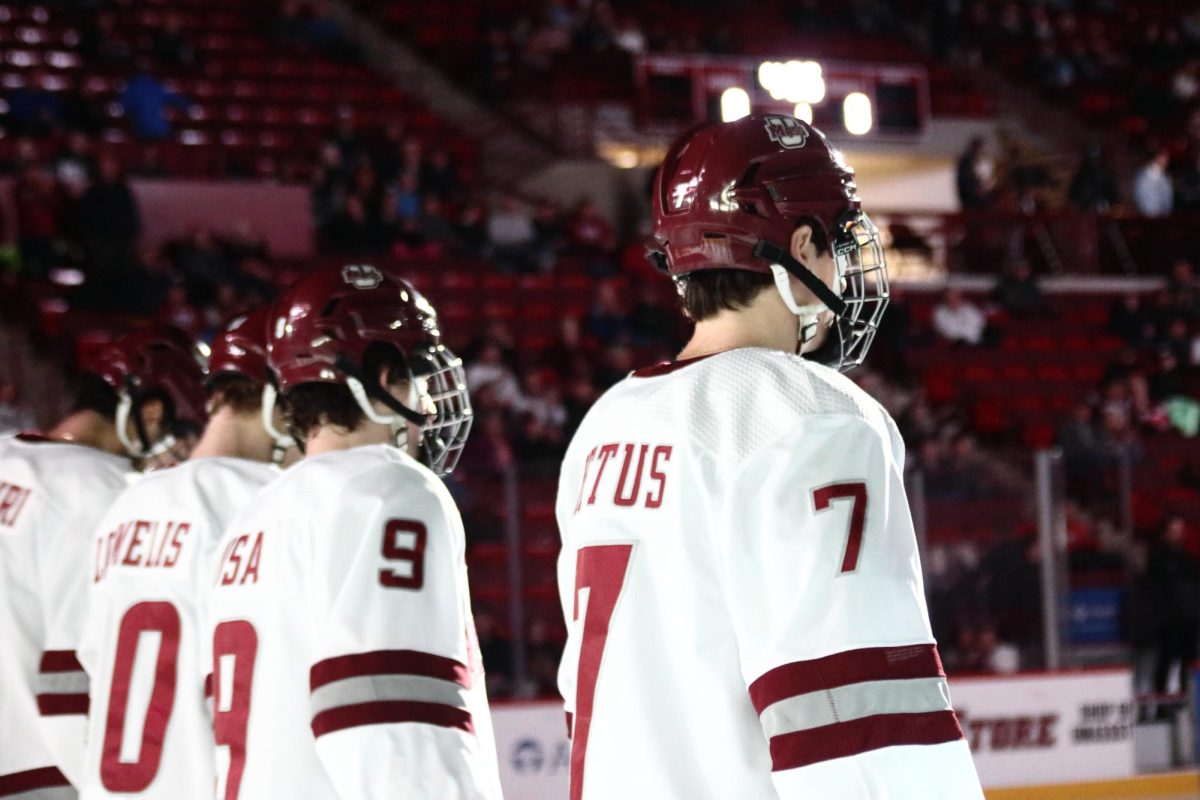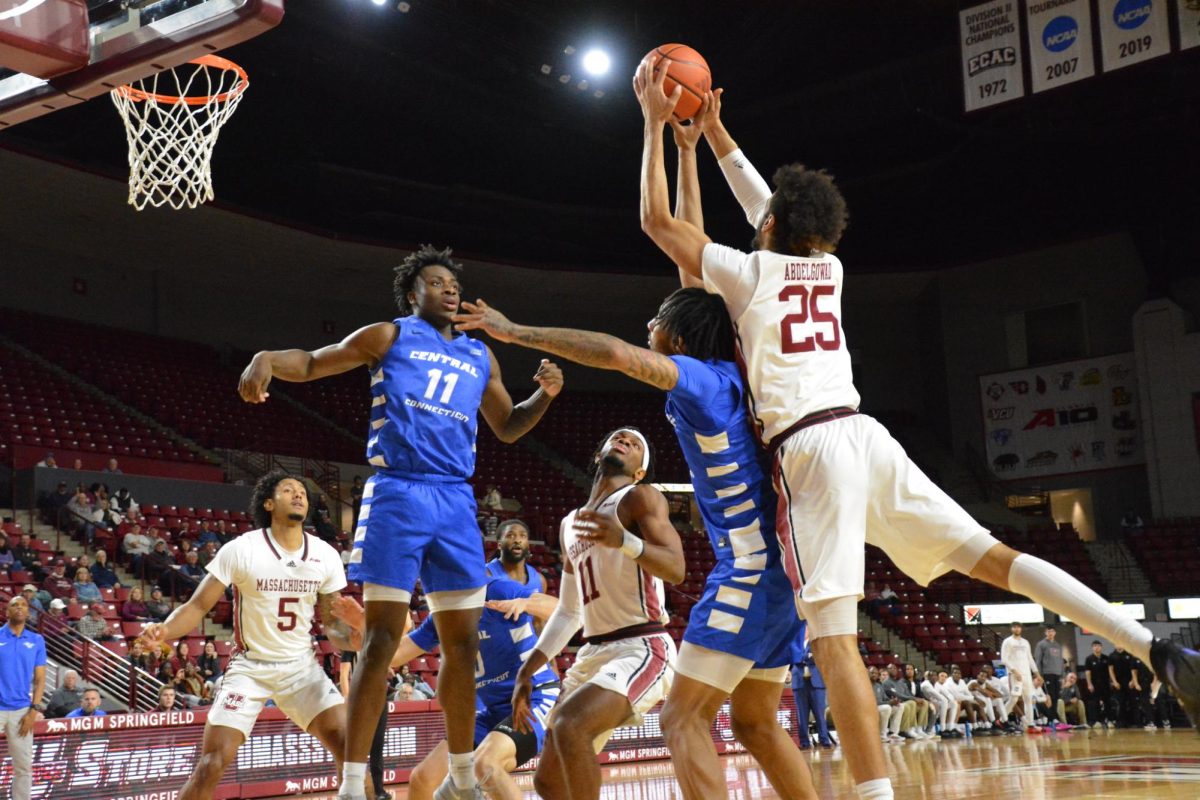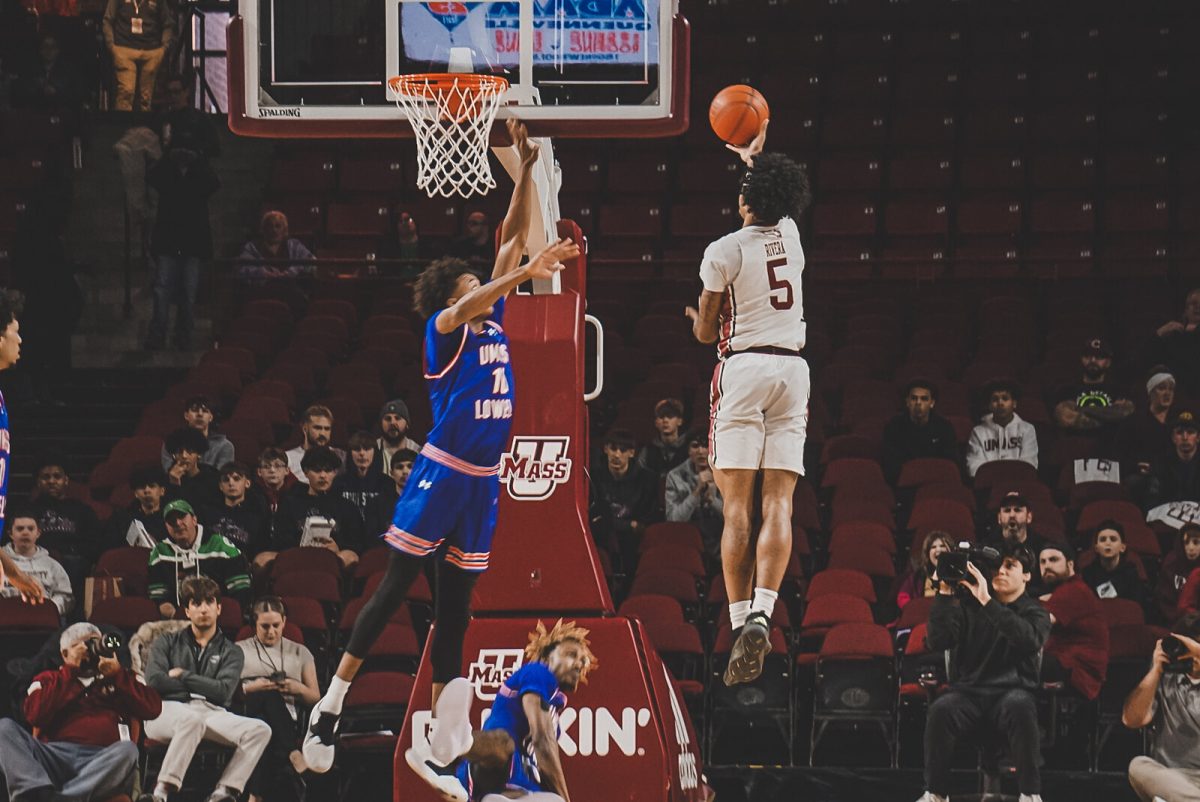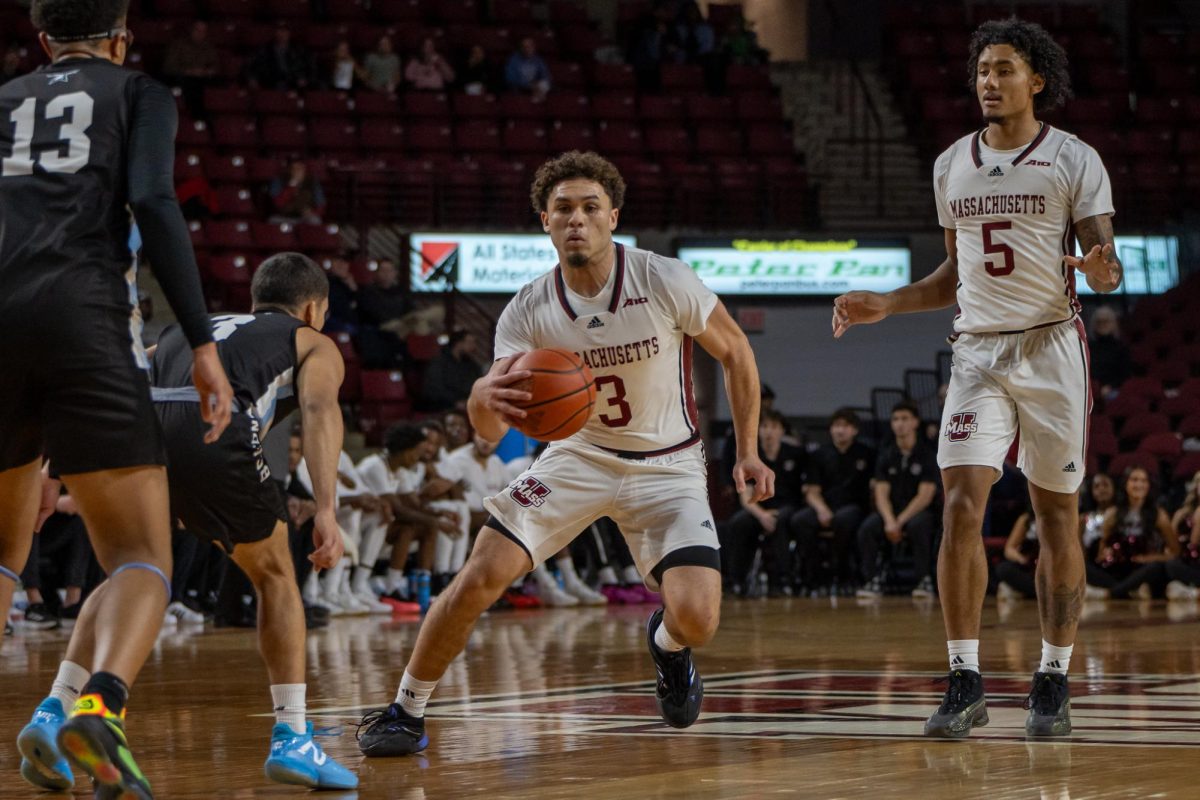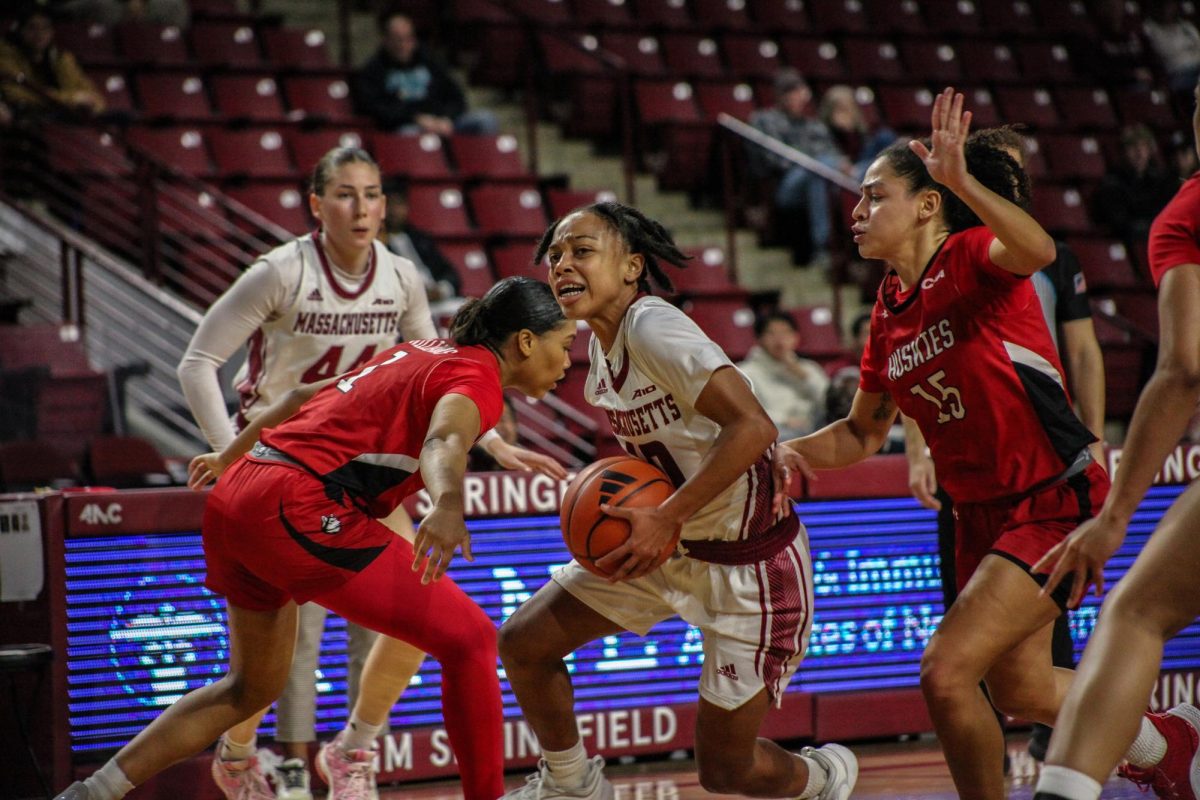A speech given by Noam Chomsky on Oct. 18 as part of an MIT Technology and Culture forum was rebroadcast last night in the Student Union Ballroom. About 400 University of Massachusetts students and area residents were in attendance for the event, which was sponsored and produced by Students for Political Awareness.
Chomsky’s speech was structured around five questions. “What is happening right now?” he asked. “What makes the attacks of September 11 historic events? What is the war against terrorism, and, by extension, what is terrorism itself? What are the origins of the September 11 crimes? And finally, what are the policy options open to the United States right now?”
The attack on Sept. 11 was historic, he said, “but not, unfortunately, because of its scale.” Though he said it was “the worst instantaneous human death toll in history, certainly,” he said the biggest change after Sept. 11 was in the balance of power between the U.S. and countries abroad. “The biggest difference was the direction in which the guns were pointing,” he said.
Chomsky then addressed the American definitions of terrorists and
terrorism. Since the Reagan administration, he said, the U.S. has regarded terrorists as “a plague, and the depraved opponent of civilization itself,” he said.
Because of its actions in Nicaragua, Chomsky said that “the U.S. still
stands as the only country to be on record as being condemned by the U.N. Security Council for international terrorism. “That was the first war on terrorism,” he said.
He next addressed the American notion that terrorism is a weapon of
cowards. “Terrorism is not a weapon of the weak,” he said. “In a world that is ruled by force, it is the weapon of the strong.”
The difference between so-called terrorists like bin Laden, he said, and the terror perpetrated by the U.S. was that “our terror doesn’t count as terror.” He added that he felt the U.S. had a “monopoly on violence” that allowed them to get away with such actions.
This comment on the video drew applause from both the MIT and the UMass audiences.
In discussing the origins of the Sept. 11 attacks, Chomsky drew a distinction between “the actual agents of the crimes” and “the reservoirs of sympathy and support that they draw from.”
As far as the actual agents go, Chomsky claimed, “the U.S. is either
unwilling or unable to produce concrete evidence about their identities.”
Chomsky called the American perceptions that Arab extremists “hate
us because we champion a new world order which should be in place everywhere” and that terrorists “seek only apocalyptic nihilism” incorrect.
“They’re comforting ideas,” he said. “But it’s totally at variance with
everything we know and it’s a perfect way to escalate the cycle of violence. It’s tribal violence.”
The way to stop this cycle, Chomsky said, is simple. “One easy
way – and therefore it’s never discussed – to stop terrorism is to stop taking part in it,” he said.
Awareness among Americans is also important in breaking the cycle of terrorist violence, according to Chomsky. “One of the best things to happen since Sept. 11 is that some discussion and some press has begun to open up to these ideas,” he said. “There’s been more willingness to think about things that have [previously] been swept under the rug.
“We should make it possible to discuss this,” he concluded. “The only way a powerful state [like the U.S.] can be brought to a stop is from within. Maybe then we could prevent new things from happening – new things so severe that they could make September 11 pale into insignificance.”
The video presentation of Noam Chomsky’s lecture on international terrorism allowed plenty of room for student response, both at the original lecture at MIT and at its rebroadcast at the University of Massachusetts yesterday. Before conducting its own discussion, the UMass audience had the chance to view the question-and-answer session from the original MIT lecture, which was also included on the videotape.
The discussion at MIT sometimes grew heated. One man on the tape asked Chomsky who should claim responsibility for the Sept. 11 attacks. “Surely you don’t blame America for the events of September 11,” he said.
“The people we’re killing aren’t defending the Taliban,” he added. “They’re the victims of the Taliban too. They are perfectly innocent people, people who we are acting consciously – you and I are acting consciously – to kill. If we can’t face that we can’t even talk about this problem.”
“Let’s look in the mirror,” he said. “The first place to look is in the mirror.”
The question and answer session at UMass was more peaceful. The discussion was formally moderated by Professor John Cunningham and Orchard Hill Assistant Residence Director Yohannes Wildermariam but was largely conducted among the students themselves.
“I wonder why there is so much complacency and perhaps there is more to it than that,” one student said. “Perhaps guilt is something we’re all afraid to recognize.”
“Bombing is not the answer,” said another. “We need to contact our legislators.”
“I feel really paralyzed,” another woman said as she took the microphone. “What can we really do? What kind of power do we really have beyond going out and shouting and crying and being misrepresented in the papers?”
Mohammed Reza, a senior Biology major and an RA in Field, helped to organize the event. He said he felt that it had gone well and that he hoped that last night’s success would encourage further discussion on campus about Afghanistan and U.S. foreign policy. “We need to get the awareness out there that this bombing isn’t hurting the Taliban. It’s hurting the 18 million people of Afghanistan. I mean, we don’t see the pictures of little kids missing limbs running to the border for safety. We don’t see mothers crying. All we see is sparks in darkness, at a distance.”
But there is hope, he added. “I believe that Americans are genuinely good people. These kinds of discussions need to go out there.”

